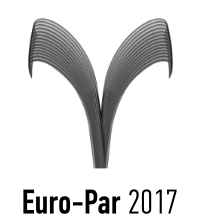New computer systems supply an opportunity to improve the performance and the energy consumption of the applications by the exploitation of several parallelism levels. Heterogeneity and complexity are the main characteristics of modern architectures. Thereby, the optimal exploitation of modern platforms becomes a challenge. The scheduling and load balancing techniques are relevant topics for the optimal exploitation of modern computers in terms of performance, energy consumption, cost of using resources and so on.
This topic invites papers on all aspects related to scheduling and load balancing on parallel and distributed machines, from theoretical foundations for modelling and designing efficient and robust strategies to experimental studies, applications and practical tools and solutions. It applies to multi-/manycore processors, servers, heterogeneous and accelerated systems, HPC clusters as well as distributed systems such as clouds and global computing platforms.
Focus
All aspects related to scheduling and load balancing on parallel and distributed machines including but not limited to:
- Scheduling algorithms for homogeneous and heterogeneous platforms
- Theoretical foundations of scheduling algorithms
- Robustness of scheduling algorithms
- Multi-objective scheduling
- Scheduling, coordination and overhead at extreme scales
- On-line scheduling
- Energy-awareness in scheduling and load balancing
- Workload characterization and modelling
- Workflow scheduling
- Performance models for scheduling and load balancing
- Resource management and awareness
- Reproducibility of scheduling
Committee
Chair: Florina Ciorba (University of Basel, Switzerland)
Local chair: Ester Garzón (University of Almería, Spain)
José Luis Bosque Orero (Univedrsity of Cantabria, Spain)
Radu Prodan (University of Innsbruck, Austria)
José Gracia (High Performance Computing Center Stuttgart, Germany)
Ioana Banicescu (Mississippi State University, USA)
Julius Zilinskas (Vilnius University, Lithuania)
Bora Uçar (CNRS and LIP ENS Lyon, France)
